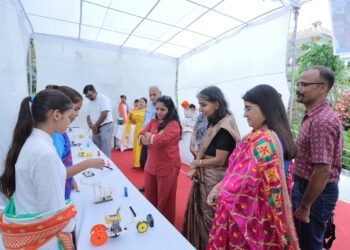
Words Manish Kumar
NEW DELHI (India CSR): The embedded systems industry plays a crucial role in modern technology, powering a vast range of devices from industrial safety equipment to consumer electronics. As devices become more feature-rich and connected, ensuring efficient battery utilization without compromising core functionality has become a priority.
Anand Singh has been at the helm of tackling these challenges, particularly in power management for embedded Linux systems. “Ensuring a product meets operational goals while maximizing battery life is a balancing act,” he explains. His work has resulted in considerable improvements, ensuring that products maintain a full 24-hour operational mode while preserving 40% of battery life by the end of the day. These contributions have been helpful in enhancing product reliability, particularly in outdoor environments where GPS tracking remains active. “Devices must remain functional even under low battery conditions. By optimizing GPS and Wi-Fi power consumption, we ensured stable performance over extended periods,” he adds.
“Wi-Fi scanning in passive mode allowed us to achieve deterministic power consumption,” he notes. His ability to fine-tune the system’s Delivery Traffic Indication Message (DTIM) interval reduced idle power usage, extending battery longevity and improving user experience. These efforts were recognized with a Spot Award from Honeywell, acknowledging his role in driving product efficiency and customer satisfaction.
Beyond power optimization, he played a critical role in simplifying the production testing and validation processes. “Reducing development cycles is key to faster time-to-market. Our deterministic battery consumption model allowed for better software update planning and lifecycle management,” he states. His strategies have helped align Honeywell’s operational goals with market expectations, ensuring efficient deployments.
During his time at the Wireless Center of Excellence at the previous organization, he contributed to several major industrial safety projects, which helped to Launch various product-line for Wi-Fi based portable hazardous gas detectors with user location capabilities. “Industrial safety devices require robust communication and energy efficiency. Any failure in the field can have severe consequences,” he emphasizes. He was responsible for integrating wireless communication protocols, optimizing battery consumption, and enhancing system reliability for these critical safety products.
“By refining power management strategies, we extended battery life while ensuring real-time data transmission remained unaffected,” he explains. Under his optimization efforts, battery life in Honeywell’s embedded systems was extended to operate for a full 24 hours while still retaining 40% charge. His power-saving techniques for Wi-Fi reduced unnecessary energy consumption by refining data transmission timing, significantly improving energy efficiency. “Our improvements led to a 30% reduction in energy drain during idle states,” he shares. His approach towards the embedded Linux power management directly contributed to Honeywell’s product stability and customer satisfaction.
Anand also tackled a critical challenge involving the Journaling Flash File System (JFFS) in embedded Linux systems, an issue prevalent in early adoption stages around 2009. “Back then, Linux in embedded applications was still evolving, and JFFS was prone to corruption under low-power conditions,” he recalls. His innovative solution involved kernel-level modifications that ensured write operations were performed only under stable power conditions. “File integrity was paramount. I introduced mechanisms that delayed writes until sufficient power was available, preventing corruption and instability,” he explains.
Reflecting on the impact of his contributions, he highlights the evolution of embedded Linux and its growing adoption in industrial applications. “What was once considered experimental is now standard practice. Power optimization strategies I worked on over a decade ago have laid the foundation for today’s embedded solutions,” he says. Looking ahead, he sees further advancements in AI-driven power management and predictive analytics, ensuring even greater efficiency in future embedded systems. “The future lies in intelligent power management—systems that can dynamically adjust based on usage patterns while maintaining reliability,” he predicts.
Through his technical expertise and innovative problem-solving, Anand Singh has made lasting contributions to the embedded systems industry. His work in power optimization, system reliability, and wireless communication continues to influence modern product development, reinforcing the importance of energy-efficient and high-performance embedded solutions.
About Us
Manish Kumar is a news editor at India CSR.
(Copyright@IndiaCSR)
























